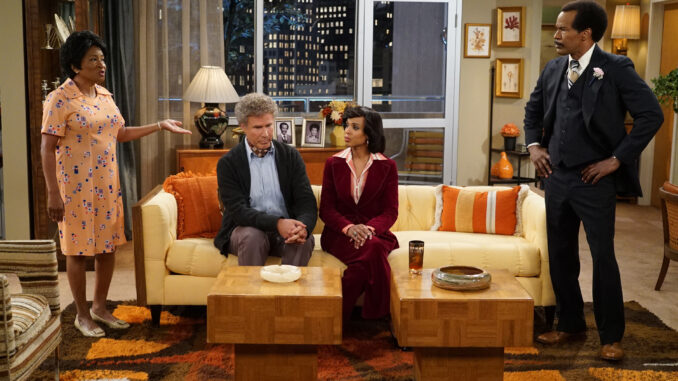
“The Jeffersons: Revisiting the Iconic Sitcom and Its Lasting Legacy”
*The Jeffersons*, which aired from 1975 to 1985, stands as one of the longest-running sitcoms in television history, second only to *Good Times* in terms of predominantly Black casts. The show made groundbreaking strides in representing Black middle-class families and even featured one of TV’s first interracial couples, cementing its status as a pioneering series. Let’s take a look back at this classic sitcom, its journey from a *All in the Family* spin-off to its abrupt ending, and the legacy it left behind.
### Origins in *All in the Family*
The Jefferson family first appeared in *All in the Family*, another sitcom created by Norman Lear that addressed contentious social issues head-on. Introduced as neighbors to the Bunkers, the Jeffersons were a working-class Black family living next to the blue-collar, conservative Archie Bunker. Louise “Weezy” Jefferson, played by Isabel Sanford, and her son Lionel (Mike Evans), quickly became regulars. However, George Jefferson, the head of the family, was absent for much of their early appearances due to actor Sherman Hemsley’s commitment to a Broadway show. To fill the gap, Lear introduced George’s brother Henry, played by Mel Stewart, though George eventually arrived to take center stage.
The dynamic between Lionel and Archie became a key element of *All in the Family*. Lionel, an intelligent and self-assured young Black man, often defused Archie’s racist comments with humor, highlighting Archie’s ignorance. Unlike Archie’s usual bigotry, he had a certain respect for Lionel, seeing him as a “credit to his race.” Lionel’s clever responses made him one of the few people who could challenge Archie’s views without confrontation, often mocking his racism with sharp wit. This dynamic offered audiences a glimpse into how racial tensions could be handled with humor and intelligence.
### *The Jeffersons*: Moving On Up
In 1975, the Jefferson family got their own show, *The Jeffersons*, when they “moved on up” from their working-class neighborhood in Queens to a deluxe apartment in Manhattan’s Upper East Side. The move represented the family’s rise from working-class to upper-middle-class success, with George Jefferson owning a chain of dry-cleaning businesses.
*The Jeffersons* introduced a memorable cast of characters that enriched the show. Sherman Hemsley’s portrayal of George Jefferson became iconic, depicting him as a brash, ambitious man who, like Archie, held his own prejudices. Louise, or Weezy, played by Isabel Sanford, served as his grounding force, balancing his fiery temper with her calm demeanor. The show also introduced Florence Johnston, the family’s sharp-tongued housekeeper played by Marla Gibbs, and Tom and Helen Willis, their interracial neighbors. The Jeffersons’ son, Lionel, eventually married Jenny Willis, a relationship that further explored racial dynamics.
The show’s humor was often interwoven with serious social commentary. While episodes tackled topics like racism, alcoholism, gun control, and gender identity, the sitcom remained focused on comedic antics. George’s ongoing verbal sparring with Florence and the humor around Mother Jefferson, George’s meddling mother, kept the laughs coming.
### Success and Guest Appearances
*The Jeffersons* quickly became a television hit, drawing millions of viewers each week. Throughout its 11-season run, the show attracted numerous celebrity guest stars, including Sammy Davis Jr., Gladys Knight, and even Donald Trump. The show’s ability to blend humor with relevant social issues made it a favorite in households across America, helping normalize the portrayal of a successful Black family on prime-time television.
Over the years, the characters evolved. Lionel and Jenny married and had a daughter, Jessica, though their relationship eventually ended in separation. Mother Jefferson passed away off-screen, and Florence even left the Jefferson household at one point for a better job, although she later returned. These shifts reflected the passage of time and kept the series feeling dynamic and fresh.
### The Abrupt End
Despite its long-running success, *The Jeffersons* met an unexpected and unceremonious end. In 1985, CBS abruptly canceled the show without any notice to the cast or crew. Actor Sherman Hemsley only found out about the cancellation through a newspaper article. The lack of a proper send-off or final episode disappointed fans and cast members alike. There was no farewell, no closing storyline to wrap up the beloved characters’ journeys, leaving viewers with unresolved questions about the Jefferson family’s future.
### Tying Up Loose Ends on *The Fresh Prince of Bel-Air*
In a surprise twist, fans got a long-awaited conclusion to the Jeffersons’ story in an entirely different show—*The Fresh Prince of Bel-Air*. In the 1996 series finale of *Fresh Prince*, George and Louise Jefferson appeared as buyers of the Banks family mansion. This cameo gave fans of *The Jeffersons* a sense of closure, implying that the couple had moved on from their upper-middle-class life to even greater wealth. It was a fitting nod to the Jeffersons’ legacy, giving audiences the ending they had been denied in 1985.
### Legacy of *The Jeffersons*
Even though *The Jeffersons* was canceled without a proper conclusion, its legacy endures. The show broke barriers in American television, portraying a Black family’s rise to prosperity while tackling controversial topics with humor and grace. Louise Jefferson, in particular, became a symbol of strength and dignity, while George’s loud, unapologetic personality pushed conversations around race and class into the mainstream.
Norman Lear’s genius in creating socially relevant sitcoms is evident in *The Jeffersons*. The show was not only entertaining but also helped to shift the cultural landscape of television, making space for more diverse voices and stories. The Jeffersons became a symbol of upward mobility and progress, a message that still resonates today.
In 2023, *The Jeffersons* remains one of television’s most beloved sitcoms. Its influence can be seen in later shows that continue to address social issues while making audiences laugh. For many, the Jefferson family’s journey from a modest neighborhood to a deluxe apartment in the sky will always symbolize the possibility of success, perseverance, and the importance of family.
